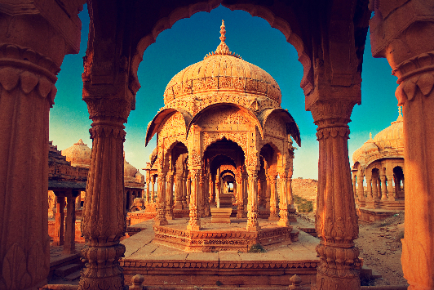The tourism industry in India has been a major contributor to the country's economic growth, with millions of tourists visiting India every year to experience its rich culture, heritage, and natural beauty. In recent years, the advent of Augmented Reality (AR) and Virtual Reality (VR) technologies has brought about a transformative impact on the tourism industry, revolutionizing the way travelers explore and experience destinations. Let's delve into how AR and VR are reshaping the tourism landscape in India.
-
Virtual Travel Experiences: AR and VR technologies are enabling travelers to embark on virtual travel experiences, allowing them to virtually explore destinations without actually being physically present. With VR headsets, travelers can immerse themselves in virtual tours of popular tourist attractions, historical sites, and natural wonders in India. They can virtually walk through the streets of bustling cities, visit iconic landmarks, and experience the culture and heritage of India from the comfort of their own homes. This is particularly beneficial for travelers who may have physical limitations, budget constraints, or time constraints, as it provides an opportunity to experience destinations that may not be feasible otherwise.
-
Enhanced Destination Marketing: AR and VR technologies are revolutionizing destination marketing by providing immersive and interactive experiences to potential travelers. Tourism boards, hotels, and travel agencies in India are leveraging AR and VR technologies to create virtual tours, 360-degree videos, and interactive experiences that showcase the country's rich cultural heritage, diverse landscapes, and unique experiences. These virtual experiences allow travelers to get a glimpse of what India has to offer and inspire them to plan their future trips. It also helps in promoting offbeat destinations, lesser-known attractions, and local experiences, thus boosting tourism in those areas.
-
Cultural Preservation: India is known for its rich cultural heritage, and AR and VR technologies are playing a crucial role in preserving and promoting this heritage. AR and VR can recreate historical sites, monuments, and artifacts in a virtual environment, allowing travelers to explore and learn about India's cultural heritage in an interactive and engaging way. This helps in creating awareness about the importance of cultural preservation and encourages responsible tourism practices that respect the cultural significance of these destinations.
-
Personalized Travel Experiences: AR and VR technologies are enabling personalized travel experiences, allowing travelers to customize their itineraries and experiences based on their interests and preferences. With AR and VR, travelers can virtually try out activities, such as trekking, scuba diving, or wildlife safaris, before actually booking them. They can also virtually experience different types of accommodations, dining options, and transportation modes, helping them make informed decisions and create personalized travel experiences that cater to their individual preferences. This enhances the overall travel planning process and provides a more tailored and memorable experience for travelers in India.
-
Education and Training: AR and VR technologies are being utilized in the tourism industry for education and training purposes. Tour guides and travel agencies in India are leveraging these technologies to provide virtual training to their staff, enabling them to gain in-depth knowledge about different destinations, cultural nuances, and travel-related information. This helps in improving the quality of service provided by tour guides, ensuring that travelers receive accurate and up-to-date information during their tours.
-
Sustainable Tourism: Sustainable tourism practices are gaining momentum globally, and AR and VR technologies are aiding in promoting responsible and sustainable tourism in India as well. Virtual experiences allow travelers to understand the impact of tourism on local communities, environments, and wildlife, and make informed choices that align with sustainable tourism practices. Virtual tours and experiences also reduce the environmental footprint associated with physical travel, as they eliminate the need for transportation and reduce overcrowding at popular tourist sites.







